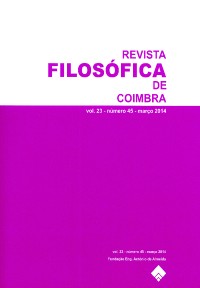Please use this identifier to cite or link to this item:
https://hdl.handle.net/10316.2/35606| Title: | O que parece saber o que não está presente: tema de estudo breve na primeira parte das investigações filosóficas de Wittgenstein | Authors: | Pais, António de Carvalho | Keywords: | causality;experience;expectation;desire;intuition;belief;certainty;language‑games;causalidade;experiência;expectativa;desejo;intuição;crença;certeza;jogos de linguagem | Issue Date: | 2014 | Publisher: | Faculdade de Letras da Universidade de Coimbra, Instituto de Estudos Filosóficos | Abstract: | O que nos faz enunciar proposições que parecem saber o que não está
presente? Esta questão e o que Wittgenstein escreveu, em 1937, sobre a causalidade
no MS 119 guiam o estudo que, assim confinado, empreendo da primeira parte das
suas Investigações Filosóficas. As conexões causais firmadas na experiência, sob a
forma de previsão ou conjectura empírica, são o que habitualmente é tomado como
explicação do que parece saber o que não está presente em proposições como sejam
as de expectativa, desejo ou justificação. Subjacente a este tipo de proposições, diz‑nos
Wittgenstein, não estão, todavia, crenças causais, mas antes crenças julgadas
certezas para as quais não existe fundamento. Devemo‑las
somente ao jogo de linguagem.
Começa assim a delinear‑se
o que viria a merecer uma especial reflexão
filosófica nos seus últimos anos de vida, cujas observações foram coligidas e publicadas
postumamente no livro Da Certeza. What makes us enunciate propositions that seem to know what is not present? This question and what Wittgenstein wrote, in 1937, about causality in MS 119 guide the study, so confined, that I undertake of the first part of his Philosophical Investigations. The causal connections predicated on experience, in the form of empirical prediction or conjecture, are what is usually taken as an explanation of what seems to know what is not present in propositions such as those of expectation, desire, or justification. Underlying this kind of propositions, Wittgenstein tells us, are not, however, causal beliefs, but beliefs judged as certainties for which there is no foundation. We owe them only to the language‑game. It starts to become visible what would merit a special philosophical reflection in his last years of life, whose remarks were collected and posthumously published in the book On Certainty. |
URI: | https://hdl.handle.net/10316.2/35606 | ISSN: | 0872-0851 | DOI: | 10.14195/0872-0851_45_10 |
| Appears in Collections: | Revista Filosófica de Coimbra |
Files in This Item:
| File | Description | Size | Format | |
|---|---|---|---|---|
| rfc45_artigo11.pdf | 6.82 MB | Adobe PDF |  |
Items in DSpace are protected by copyright, with all rights reserved, unless otherwise indicated.
